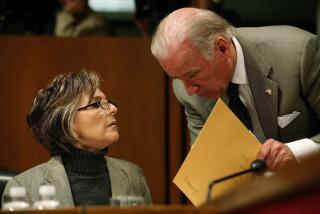Boxer, Fong in Opposite Camps on Armed Forces
- Share via
In 1970, a community activist and former stockbroker named Barbara Boxer led a drive to persuade Marin County voters to demand an end to the Vietnam War. Once the measure passed, her passionate opposition to the war led her to run for local office.
In 1971, a shy and obedient teenager from Oakland named Matthew Fong entered the Air Force Academy and swore allegiance to the United States and the commander in chief. He accepted the fact that his dreams of a military career might take him into combat in Vietnam.
A generation later the suburban peacenik and the would-be jet pilot are in a pitched contest for Boxer’s U.S. Senate seat, offering distinctly differing views on military preparedness and the role of America in the post-Cold War world.
One candidate has made a reputation as a foe of military waste and a critic of claims often made in support of big-ticket weapon systems. The other would like to make a reputation rallying new support for the military after years of what he sees as overzealous budget-cutting.
Theirs is a classic debate over how the nation should support, govern and unleash its military power.
Democrat Boxer, after serving as a county supervisor, was elected to Congress in 1982 and gained attention for finding $7,600 coffeepots and $600 toilet seat covers hidden in the Defense Department budget--discoveries that led to purchasing reforms. She opposed the costs of the Stealth bomber and the Patriot missile.
She also opposed U.S. involvement in the Persian Gulf War in 1991 and sponsored an unsuccessful effort to require a president to get congressional approval before ordering covert action in foreign countries.
As a senator, she has toned down her comments on military issues--and indeed was quickly supportive of the air strikes ordered last month by President Clinton against alleged terrorist strongholds. But Boxer has steadfastly urged cuts in military spending so that money can be redirected to domestic needs.
To Boxer, every expensive weapons system represents a lost opportunity to increase federal support for education, medical care or health research. In the House of Representatives, she served on the Armed Services Committee, but in the Senate her interests have been decidedly domestic; at present, she serves on no military or foreign policy committees.
Boxer likes to quote President Dwight D. Eisenhower from a speech near the end of his second term: “If we don’t take care of our children, it doesn’t matter how many tanks or missiles we have. We won’t be a strong nation.”
A list of weapons systems Boxer has voted against fills more than a page. Last week Boxer voted against a proposal for a scaled-down, $45-billion version of the so-called Star Wars plan to intercept long-range missiles aimed at the United States.
Republican Fong, now a lieutenant colonel in the Air Force Reserve, called Boxer’s vote “irresponsible and dangerous.” He accused her of endangering national security by refusing to back a plan to defend America against missiles launched by rogue nations or terrorist organizations.
“The intent to hurt the United States and its citizens already exists, and the technology to harm us with advanced weaponry such as ballistic missiles is rapidly developing,” Fong said. “Barbara Boxer is sticking her head in the sand.”
Fong Hopes to Use Missile Issue
Like other Republican challengers this fall, Fong hopes to use the missile issue to prove that his opponent is soft on defense. He travels to Washington this week to give a foreign policy address in which the issue is likely to figure prominently.
Boxer fired back that the missile plan favored by Fong was not supported by the Joint Chiefs of Staff, has failed early scientific testing and could require the United States to abrogate the 1972 Anti-Ballistic Missile Treaty.
“We should not be going to a system that has been failing tests and could lead to a more dangerous world,” Boxer said.
On the stump, Fong has repeatedly blasted Boxer and the Clinton administration for cutting military spending too deeply and leaving warplanes grounded for lack of spare parts, Army battalions and Navy ships inadequately staffed, and morale and combat readiness plummeting.
Boxer believes the nation’s current military budget is “just about right” and notes that her position is supported by Gen. Henry H. Shelton, chairman of the Joint Chiefs of Staff. “This isn’t Matt Fong vs. Barbara Boxer. It’s Matt Fong vs. Barbara Boxer and the Joint Chiefs of Staff,” Boxer said.
Much of the Boxer-Fong disagreement stems from opposing views about the level of urgency involved in developing a missile defense system.
Boxer, like many Democrats, believes that the country is not going to be vulnerable to missile attack in the near future and that there is sufficient time to continue testing to see if a defense system is scientifically possible before committing to building it. She has supported continued funding for testing.
Fong, citing a recent study by former Defense Secretary Donald Rumsfeld, believes that the missile program should be constructed as soon as possible and that the nation is much more vulnerable to attack than the Clinton administration concedes.
Beyond the back-and-forth over specific weapons or budgetary requests lies a philosophic split between the candidates over the nature and magnitude of the threats to the United States and how the nation should deploy its military strength. Each also sees a different lesson from the Vietnam War.
To Boxer, the lesson is that America should never send its troops into a conflict unless that decision has the continuing support of the American public. To Fong, the lesson is that once troops are sent into battle, tactical decisions should be made by the military, not by politicians and other civilians.
Both agree that military spending needed to be pared significantly after the fall of the Berlin Wall and the disintegration of the Soviet Union and about the “peace dividend” distributed to other areas, particularly education. After that, the agreement ends.
Fong believes the military cuts ran wild and that liberals such as Boxer have been slow to acknowledge that the end of the Cold War has unleashed a witches brew of ethnic rivalries, regional disputes and “freelance” terrorism.
“She [Boxer] seems to be stuck in the mentality that says the Cold War is over and the world is now safer, so why do we need to spend money on the military?” Fong said. “She stills sees this as a nice, warm, fuzzy place. I disagree.”
Boxer Sees Push for Excessive Spending
Boxer sees a desire by right-wing Republicans to buy expensive and untested military hardware by overstating the degree of danger posed to the United States. “You need a budget to be adequate enough to meet the threat, and I have faith in Gen. Shelton and before him, Gen. [John] Shalikashvili, to tell us what they believe,” Boxer said.
Fong never became a fighter pilot and was not sent to Vietnam. Instead, he helped recruit inner-city youths for the Air Force Academy and later was a systems manager and computer expert. He served on active duty during the administration of President Jimmy Carter, when the military underwent severe reductions, an experience that shaped Fong’s thinking.
To avoid a repeat of what he antimcalls the “hollow force” of the Carter years, Fong has called for a military buildup akin to that of the early years of President Ronald Reagan. He also wants to pay for it in a distinctly Reagan-esque way, with a “supply side” tax cut: “I’m from the school that says tax cuts means increased revenues.”
The two candidates also disagree on using U.S. troops for humanitarian missions, such as those undertaken in Africa, and peacekeeping missions like the current one in Bosnia. Boxer finds such missions an expression of American goodwill; Fong sees them as a waste of resources and better left to the United Nations or relief agencies like the Red Cross.
Said Fong: “Our military is now in 80 nations around the world in missions that are not necessarily military--they’re humanitarian. Our resources are stretched to the point of breaking and what’s breaking is the morale of our troops.”
Said Boxer: “I think the peacekeeping and humanitarian missions are very important and very much in the American tradition. That’s how you save lives and avoid bloodshed and having to go back in later with troops.”
(BEGIN TEXT OF INFOBOX / INFOGRAPHIC)
On Defense
U.S. Sen. Barbara Boxer and her Republican challenger, state Treasurer Matt Fong, disagree sharply on defense issues.
Threats to U.S.
Sen. Barbara Boxer: Says terrorist threat is from “suitcase” bombs and other low-tech weaponry. Agrees with Pentagon estimates that it will be years before more countries can launch long-range ballistic missiles at U.S.
Matt Fong: Believes threat is more dire, that “rogue states and terrorist organizations” are close to developing or buying offensive missile capability.
****
Military Budget
Sen. Barbara Boxer: Wants to cut $8 billion and use it to bolster education, health care, other domestic programs.
Matt Fong: Wants to beef up budget to increase personnel, improve training and equipment, increase research and development of advanced weapons systems.
****
Missile Defense System
Sen. Barbara Boxer: Opposed recent bill in Senate calling for immediate construction of anti-missile defense system to guard U.S.
Matt Fong: Favored the bill.
****
Peacekeeping/Humanitarian Missions
Sen. Barbara Boxer: Supports American participation as being in the long-range interest of U.S.
Matt Fong: Opposes as a waste of resources and a drag on troop morale.
****
Lessons From Vietnam
Sen. Barbara Boxer: Never send troops without backing from American public.
Matt Fong: When troops are sent, leave tactical decisions to military.
****
Gays in the Military
Sen. Barbara Boxer: Opposes “don’t ask, don’t tell” policy. Has attempted to make it more difficult for military to discharge homosexuals.
Matt Fong: Supports “don’t ask, don’t tell” policy.
More to Read
Get the L.A. Times Politics newsletter
Deeply reported insights into legislation, politics and policy from Sacramento, Washington and beyond. In your inbox twice per week.
You may occasionally receive promotional content from the Los Angeles Times.










